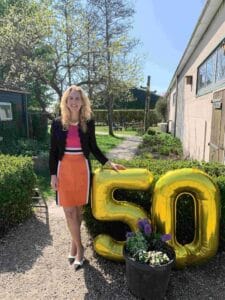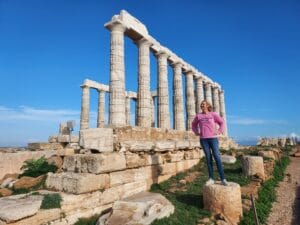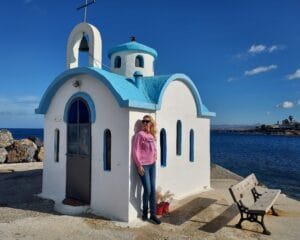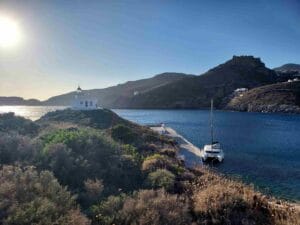On May 1. 2025, we celebrate a milestone: exactly four years ago, we began our world journey aboard our catamaran, while I worked as an online Trainer. Since then, we’ve had countless adventures, overcome many challenges, and learned some valuable lessons. I’d love to share 10 personal insights that this journey has brought me.
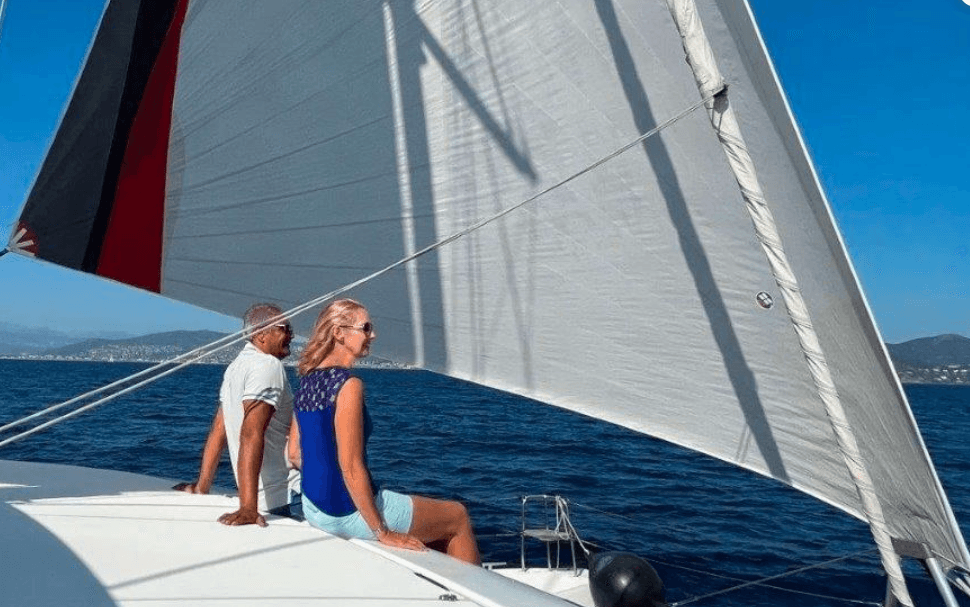
1. Confidence grows with every mile
When we set off on May 1. 2021, we had trained for two years with the catamaran and with sailing. We bought the boat in April 2019, and then did we start learning how to sail! Just like driving a car, you only truly learn by doing the miles—or in our case, nautical miles.
One important lesson I’ve learned is this: don’t wait until you think you’re fully ready or confident. Because then you’ll never leave. Confidence comes from experience; it doesn’t need to be there from the start. This also applies to the profession of being a trainer. I’ve been giving training for 25 years now, and in the early years, I wasn’t as skilled as I am today. But you have to start somewhere in order to gain experience!
So yes, May 1. 2021, felt like a leap into the unknown. A world trip by boat? You have no idea what you’re getting into. But that’s the beauty of it: “I’ve never done it before, so I think I can do it.”
Every journey brought new experiences: unfamiliar harbors, tidal differences, unexpected weather, technical problems. Uncertainty becomes part of the adventure—it actually becomes your new normal.
This also applies to the profession of training: it’s never finished. The COVID period brought online training, hybrid training, and now ChatGPT. Do you need to know everything 100% as a trainer before you begin? No—you need to start, experiment, and build experience along the way.
With every successful crossing, our confidence grew. We learned to trust ourselves, our boat, and each other. This journey taught me that confidence is not a prerequisite but something that grows with experience.
2. The power of simplicity
Living on a catamaran means living with limited space and resources. We brought 30 boxes from our house and stored them in the bottom of the boat. Two years later, half of those same boxes were still untouched….
Turns out—you don’t need much to live. I was surprised by how little you actually need, rather than how much. We were content with what we had and got creative when resources were limited. Sometimes we couldn’t find a shop for days. A simple meal became a moment of gratitude.
We realized that happiness doesn’t come from possessions, but from experiences and connection. The power of simplicity enriched our lives and shifted our priorities.
I realized this also applies to my work as online Trainer: it’s not about fancy tools, showing how much digital confidence you have. The core of my profession is making personal connection and help my participants grow in their work. Keep it simple and people appreciate the straightforwardness.
3. Flexibility is essential
At sea, you quickly learn that plans are merely guidelines. Weather, technical issues or local regulations can change everything.
In the beginning, this frustrated me. I wanted control and predictability. I’ve been giving training for 25 years—20 of those in the Netherlands—and by April of a year, my schedule for the whole year was already booked. On April 6, I knew where I’d be on October 23.
So when your agenda suddenly depends on nature, and your plans change three times a day because the wind shifts—it takes getting used to. Adapting felt like failing. But I’ve learned that flexibility is a strength.
By going with the flow, we discovered unexpected gems: an idyllic bay, a welcoming community. Flexibility brought adventures we would otherwise have missed. It taught me to let go and trust the process.
This mindset has helped me not only at sea, but also in everyday life. The ability to shift and adapt is vital. Flexibility is not a compromise—it’s an art of living.
4. Growing together
As a trainer, I know that you hardly learn by your own. Learning is often down in a social context with other people.
Living on a boat is intense. You share not only space, but also emotions, challenges and triumphs. And when something annoys you or you’re grumpy, well, there’s only one person around to take it out on… 😉
At first, I was a bit anxious. Gilles and I get along really well, we’re respectful and trust each other. But would we get sick of each other after twelve-hour sailing days, or worse—after years of being together 24/7 in a small space?
Over the four years, we saw couples break up due to the sailing lifestyle.
Thankfully, that didn’t happen. Gilles said at one time: ‘I find that shared experiences brought us closer’. We got to know each other even better. We grew not only as individuals, but also as a team. This joint growth deepened and strengthened our relationship.
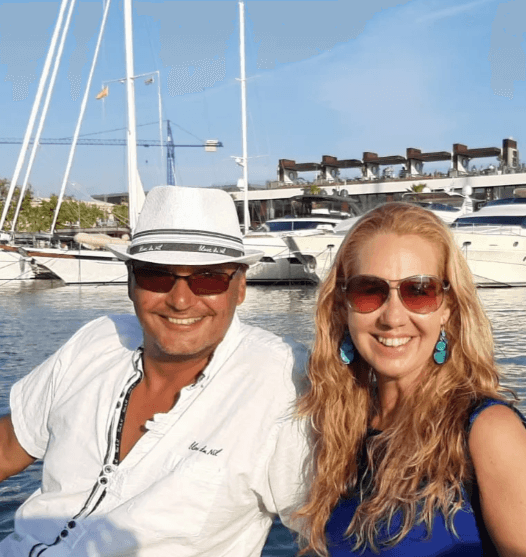
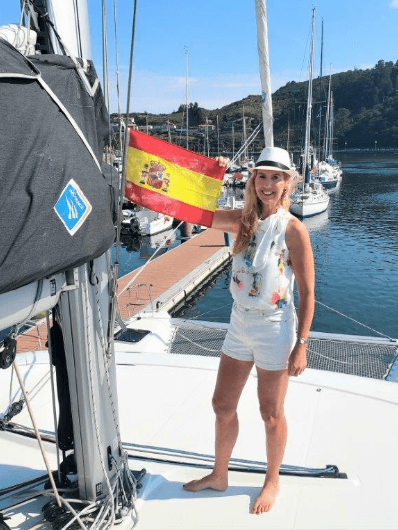
5. Connection with nature
At sea, you are fully dependent on nature. The wind sets your speed, the waves your comfort, and the sun your power supply.
This dependency gave us immense respect for natural elements. We learned to read nature’s signs—clouds forecasting wind, marine life behaving differently. I used to be oblivious to nature, but living on the water brings things like tides and currents to life. By relaxing, you learn to observe your surroundings more closely. And your sense of smell sharpens too—you can smell the salt of the sea when you set sail, and the scent of pine trees when you return closer to land.
We also became aware of our ecological footprint. We started separating waste, conserving water, and using sustainable energy.
This connection with nature increased our sense of care and appreciation. We learned to live in harmony with our surroundings. Nature isn’t just the backdrop—it’s a partner in the adventure.
6. Learning from others
Along the way, we met countless sailors and locals, each with their own stories and wisdom. These encounters offered new perspectives and reminded us that there are many ways to live and travel.
We shared experiences, tips, and even worries. These exchanges enriched our journey and our understanding of the world.
We learned that being open to others leads to growth and connection. The sailing community is a great source of inspiration and support.
I’ve noticed that this has also seeped into my work as an online trainer. When you talk, you learn less. When you ask questions, you learn more.
Growing up, you often hear, “Don’t talk to strangers,” or “Don’t blindly trust strangers.” But locals know their area—and most people are good.
This journey taught us to travel with an open heart and mind. Every encounter is an opportunity to learn and grow. And for me, that is also a core value in (working) life.
7. Developing self-reliance
On a boat, you’re responsible for everything: navigation, maintenance, cooking, safety. As inexperienced sailors, it was overwhelming at first—especially managing energy: do we have enough drinking water and electricity? How do we anchor safely for the night?
Gradually, we developed skills and confidence. We learned to solve problems, improvise, and think ahead.
You can’t over-plan everything—despite thorough preparation, you must remain flexible. Make a plan A, and a plan B in case the harbor is full or the wind changes. It sounds contradictory, but it works.
As the sailor’s saying goes: “Plans are written in the sand at low tide.”
We discovered we’re capable of more than we thought. This self-reliance gave us independence and pride. Every challenge became an opportunity to learn and grow. These skills are valuable both at sea and in everyday life.
Self-reliance has made us more resilient. Knowing you can rely on yourself is a powerful feeling.
When I was in the Netherlands, I asked one of my best friends: do you see change in me, after these years of sailing? She responded: you are more relaxed, you live more in the moment. In the past, you weren’t so interested in practical matters—you were more book-smart. But now, you’re more hands-on and quicker to help with practical tasks.
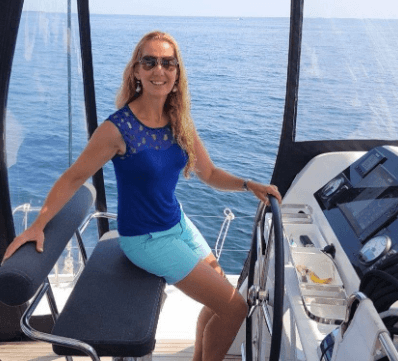
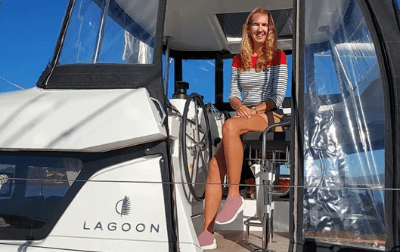
8. Appreciating the little things
Life on a boat makes you appreciate small joys. A warm shower, fresh fruit, or a peaceful anchorage become precious moments.
These simple pleasures brought us joy and gratitude. We learned to enjoy the present and see beauty in the ordinary.
This attitude brought us peace and contentment. It taught us to want less and appreciate more.
Gilles said at one point: ‘I was a bit afraid you would miss our comfortable life. Because on board, there’s sometimes no really hot water to shower or lack of variety in food. But you never complain, you enjoy what we have’. I was happy he said that to me and I was actually surprised myself that I am ok with less comfort in all these years.
When I hear people complain, I sometimes think: “Those are first-world problems.” Be glad you’re healthy, have a good home, electricity every day and food on the table.
9. Pushing your limits
On our journey, we faced situations that tested our limits: high waves, strong winds, technical failures. Sometimes, not knowing what you’re getting into is a blessing—if I had known I’d be sailing in 6-meter waves, I might never have left on May 1. 2021!
But we’ve literally experienced this ourselves: growth lies outside your comfort zone. It also sometimes takes courage to leave the safety of the shore and venture into the unknown.
These experiences built our confidence and perseverance. Pushing our limits changed our perspective and broadened our horizons.
10. Home is where the anchor drops
A common question is whether I miss the Netherlands. Of course, I miss family and friends. But I’ve learned that home isn’t necessarily a physical place.
Our catamaran is our home, no matter where we are.
The feeling of home comes from familiar routines—like drinking a cup of Earl Grey or reading in my favorite chair.
Every new anchorage offers a different view, but the feeling of home remains constant. This journey has reshaped and enriched my definition of ‘home’.
The adventure continues!
Though we’ve experienced a lot already, we’re far from finished. We’ve now visited 17 countries by boat—but that’s just Europe, a postage stamp on the world map! We still want to sail around the world. We don’t work with deadlines—20 years of deadlines in the Netherlands were enough.
As long as we enjoy this lifestyle, it goes well, and we stay healthy—we’ll keep going. To lesser-known regions too. It still feels like the adventure has only just begun.
This journey has taught us to embrace the unknown and live life as it comes.
And adventure isn’t only found in faraway places—it’s also in everyday life.
It’s a mindset of curiosity, courage, and openness.
These lessons reflect our personal journey and the insights we’ve gained along the way.
We hope they inspire others to go on their own adventures and learn from the world around them.
And one last tip: don’t call what you want to do a dream—call it a plan.
Because when you call it a plan, you start taking action, it comes to life, and others will start helping you make it real.

